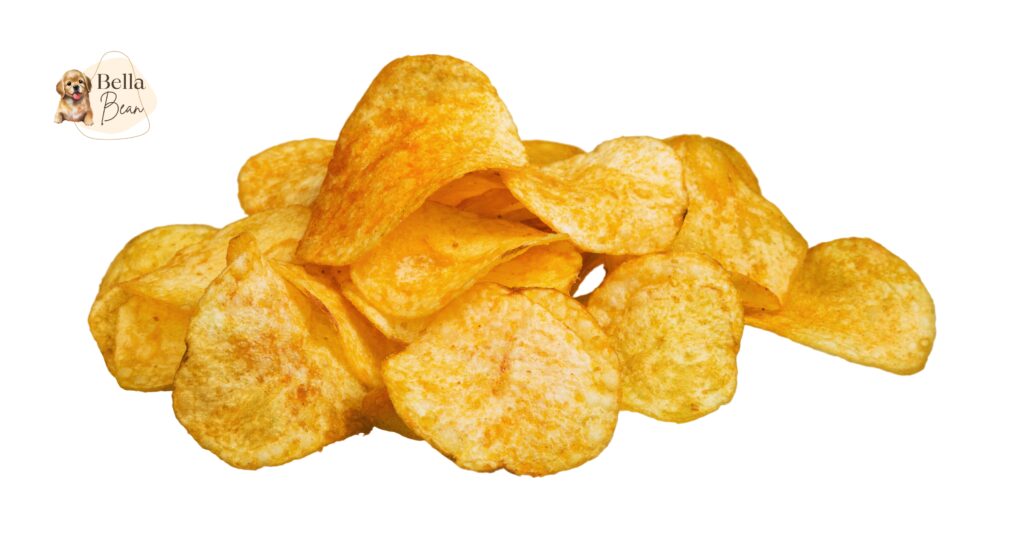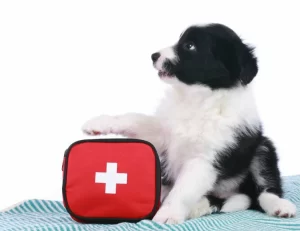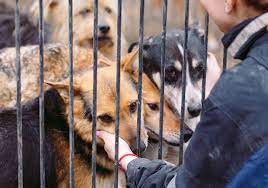Can Dogs Have Salt and Vinegar Chips? Providing dogs with salt and vinegar chips or flavored chips as treats is discouraged. Such chips typically have elevated salt content, posing potential harm to dogs and increasing the risk of conditions such as sodium ion poisoning.
Salt and vinegar chips are a popular snack among humans, but what about our furry friends? Here is a question: Can dogs have salt and vinegar chips? As dog owners, we want to share everything with our dogs, including our food.
However, when it comes to certain human foods like salt and vinegar chips, we need to be cautious. In this article, we will explore whether or not dogs can have salt and vinegar chips and the potential risks associated with feeding them to our canine companions.
Table of Contents
ToggleWhy are Salt and Vinegar Chips Popular?
Before we dive into whether or not dogs can have salt and vinegar chips, let’s first understand why they are so popular among humans.
Salt and vinegar chips are a combination of salty, tangy, and acidic flavors that create a burst of flavor in the mouth.
The vinegar adds a tangy kick, while the salt enhances the overall flavor.
This combination of flavors makes these chips irresistible to many people.

Can Dogs Have Salt and Vinegar Chips?
The short answer is no; dogs should not have salt and vinegar chips. While they may be tasty for humans, they can be harmful to our furry friends. There are a few reasons for this:
- High salt content: Salt and vinegar chips are high in sodium, which is not suitable for dogs. Dogs have much smaller bodies than humans and can easily become dehydrated if they consume too much salt.
- Potential allergic reactions: Some dogs may be allergic to the ingredients used in salt and vinegar chips, such as vinegar or certain seasonings. If your dog has a history of allergies, it’s better to steer clear of these chips.
- Vinegar can upset a dog’s stomach: The high acidity in vinegar can cause digestive issues for dogs, such as vomiting or diarrhea. This can be uncomfortable and potentially dangerous for our canine companions.
In general, it’s best to stick to dog-friendly snacks that are specifically designed for our furry friends. These snacks are formulated to meet their dietary needs and do not contain any ingredients that may be harmful to them.

What Snacks Can Dogs Have?
While salt and vinegar chips are off-limits, there are plenty of other snacks that dogs can enjoy in moderation. Some examples include:
- Fruits and vegetables: Many fruits and vegetables make great treats for dogs, such as apples, carrots, and green beans. Just be sure to remove any seeds or pits that may be harmful.
- Plain popcorn: Popcorn without any added salt, butter, or other seasonings can be a fun and tasty snack for dogs.
- Lean meats: Dogs can have small amounts of lean meats like chicken or turkey as long as they are cooked and not seasoned with any harmful ingredients.
- Frozen treats: In hot weather, frozen fruits or even plain yogurt can make a refreshing snack for dogs. Just be sure to check the ingredients and avoid anything that may be toxic to dogs, such as xylitol.
Overall, it’s important always to read ingredient labels and consult with a veterinarian before giving your dog any human snacks.
While some may seem harmless, they can potentially cause harm to our furry friends. It’s always better to err on the side of caution and stick to snacks specifically made for dogs.
Additionally, it’s important to remember that treats should not make up a large portion of a dog’s diet and should only be given in moderation.
Too many snacks, even healthy ones, can lead to weight gain and potential health issues for dogs. A balanced and nutritious diet is essential for their overall well-being.
So, while it’s fun to share our snacks with our canine companions, let’s make sure we do so responsibly and always prioritize their health. So what are you waiting for? Grab some dog-friendly snacks and treat your furry friend.

Are Salt and Vinegar Chips Safe for Dogs?
You have a question: Can dogs have salt and vinegar chips? The answer is No. But the other question arises: if they have salt and vinegar chips, are they Safe for dogs?
While it may be tempting to share your favorite salt and vinegar chips with your dog, it’s important to know that these types of snacks are not recommended for our canine companions.
Salt and vinegar chips can contain high levels of sodium and acidic ingredients, which can be harmful to dogs.
Too much salt in a dog’s diet can lead to dehydration, electrolyte imbalances, and even kidney damage.
Similarly, the acidic properties of vinegar can irritate a dog’s stomach and potentially cause digestive issues.
It’s best to stick to dog-friendly snacks and avoid giving your dog any human food that may be high in sodium or acidity.
If you’re looking for a salty and crunchy treat for your pup, opt for unsalted, plain popcorn or homemade sweet potato chips instead.
Remember, always consult with your veterinarian before introducing any new snacks or treats into your dog’s diet.
They can provide you with personalized recommendations and help ensure that your furry friend stays happy and healthy.
So, next time you reach for a bag of salt and vinegar chips, remember to save them for yourself and give your dog a safer alternative.
Your pup will thank you for it! So, let’s keep our furry friends in mind and make responsible snack choices for them. After all, a healthy dog is a happy do.
So go ahead and continue to spoil your canine companion with delicious and nutritious treats specifically made for them.
And remember the importance of maintaining a balanced diet and regular exercise for their overall well-being. With a little bit of extra effort, you can ensure that your dog is living their best life and enjoying every moment with you.
So here’s to making smart snack choices for our beloved furry friends! Let’s keep them healthy and happy for years to come.
Guidelines for Sharing Salt and Vinegar Chips with Your Dog
- Always consult with your veterinarian before introducing any new human food into your dog’s diet.
- Avoid giving your dog salty and acidic snacks like salt and vinegar chips, as they can be harmful to their health.
- Stick to dog-friendly alternatives such as unsalted, plain popcorn or homemade sweet potato chips for a tasty treat.
- Remember the importance of maintaining a balanced diet and regular exercise for your dog’s overall well-being.
- Be responsible and considerate when sharing snacks with your furry friend. Their health should always come first.
While it may be tempting to share your favorite snacks with your dog, it’s important to remember that not all human food is safe for our four-legged companions.
When in doubt, always consult with your veterinarian for guidance on what foods are safe and appropriate for your dog.
And when it comes to salt and vinegar chips, it’s best to avoid sharing them with your dog altogether.
These snacks are high in sodium and can be harmful to their health, leading to issues such as dehydration, electrolyte imbalance, or even kidney problems.
Conclusion
We conclude your question: can Dogs have salt and vinegar chips in this way? As pet owners, it’s our responsibility to ensure that our dogs are getting the proper nutrition they need for a long and healthy life. While we may want to indulge them with tasty treats like salt and vinegar chips, it’s important to prioritize their health and well-being first. When in doubt, stick to dog-friendly alternatives or consult with your veterinarian for guidance. With a balanced diet and regular exercise, we can keep our furry friends happy and healthy for years to come. Let’s make responsible decisions when it comes to sharing snacks with our dogs. So next time you’re snacking on some chips, remember to choose wisely for your canine companion’s sake.
FAQs
Can I share any snacks with my dog?
No, not all human foods are safe for dogs. Consult with your veterinarian for guidance on appropriate and safe snacks for your furry friend.
Why should I avoid sharing salt and vinegar chips with my dog?
These snacks are high in sodium and can be harmful to their health, leading to issues such as dehydration, electrolyte imbalance, or even kidney problems. It’s best to stick to dog-friendly alternatives or consult with your veterinarian for guidance.
How can I ensure my dog is getting the proper nutrition?
It’s important to feed your dog a balanced and nutritious diet specifically designed for their needs. Consult with your veterinarian for recommendations on the best food and feeding schedule for your dog.


![The Ultimate Guide to Road Tripping with Your Dog [2025 Update]](https://bellabeanupdate.com/wp-content/uploads/2025/05/pexels-photo-1143369-300x209.jpeg)





























